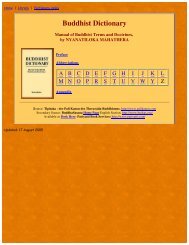The Three Basic Facts of Existence II: Suffering (Dukkha) - Buddhist ...
The Three Basic Facts of Existence II: Suffering (Dukkha) - Buddhist ...
The Three Basic Facts of Existence II: Suffering (Dukkha) - Buddhist ...
- No tags were found...
Create successful ePaper yourself
Turn your PDF publications into a flip-book with our unique Google optimized e-Paper software.
Angels are bright still, though the brightest fell.But tell me, how do you knowhe lost any <strong>of</strong> his brightness in the falling?In the dark-blue depths, under layers and layers <strong>of</strong> darknessI see him more like the ruby,a gleam from within his own magnificencecoming, like the ruby in the invisible dark,glowing with his own annunciation towards us.45This concept <strong>of</strong> a division <strong>of</strong> power became solidified into a dualism <strong>of</strong> good as opposed toevil, <strong>of</strong> light as opposed to darkness, leading to the development <strong>of</strong> a system calledManichaeism, in which God was to be worshipped and the Devil to be propitiated by rite andceremonial deemed appropriate to the occasion. This was indeed an ingenious method devisedfor playing it safe. Many <strong>of</strong> the trials for witchcraft were based on suspicion <strong>of</strong> participation inthe rites <strong>of</strong> giving the evil his due, and though the witches were disgusting, their persecutorsand tormentors were even more so. However, this awakening <strong>of</strong> interest and pre-occupationwith the Devil is not as outrageous as it first appears. <strong>The</strong> God that man creates is always in hisown image, and Jehovah, a product <strong>of</strong> the ancient Hebrews still in a stage <strong>of</strong> barbarism, wascapricious, jealous, vindictive, and given to tantrums, so it is not altogether surprising that somepeople should turn to the opposition, unconsciously making an anti-hero <strong>of</strong> the Devil.To pinpoint a large measure <strong>of</strong> guilt on to man himself, the Christian church thought up thedogma <strong>of</strong> original sin, into which, after the fall <strong>of</strong> Adam, all men were automatically born.Superimposed on this theory is the Christian doctrine <strong>of</strong> atonement, which does nothing toresolve the contradictions. Why the almighty God had to send Jesus down to be killed, justbecause Adam had broken a taboo, is beyond the understanding <strong>of</strong> normally intelligent mortals.Why could not the almighty simply have forgiven and forgotten all about it, without keepingup the grudge for thousands <strong>of</strong> years? Even the most imperfect human being would find it anintolerable burden to keep up a grudge for a whole life-time—let alone for thousands <strong>of</strong> years.<strong>The</strong> fact remains that dukkha, or the omnipresence <strong>of</strong> suffering, remains the bane <strong>of</strong> alltheistic religions. <strong>The</strong> embarrassing questions continue to be asked: “Did not God know, rightfrom the start, that Adam must fall?” And, “Since eating the forbidden fruit is universallyinterpreted as meaning indulging in sexual intercourse, why were Adam and Eve providedwith the necessary equipment for so doing, if the almighty did not intend it ever to be used butkept in perpetual cold storage?” “Did God not know beforehand that the Devil would rebelagainst him, and having once rebelled, why did he allow him to run a hell?” If he did not know,then he is not omniscient. He either can or cannot put an end to dukkha (suffering). If he can,then he does not do so, and is therefore not good. If he would like to do so but has not thepower, then he is not omnipotent. To all these queries the theologians are forced to fall back onthe stereotyped reply: “Inscrutable are the workings <strong>of</strong> providence!,” which, in this day and age,is just not good enough.<strong>The</strong> house <strong>of</strong> thought built up so laboriously by the theologians has had its day—asurprisingly long day. It has had a rich past, but the present is shaky and the future looks verydim. Scepticism is undoubtedly the order <strong>of</strong> the day due to a variety <strong>of</strong> reasons, but mainlyowing to the development <strong>of</strong> science, the diffusion <strong>of</strong> education, and to the changing structures<strong>of</strong> society itself. Indifference to religion and scepticism can and do break out into explosivehatred in urban ghettoes where large sections <strong>of</strong> humanity live in poverty and squalor andunder conditions <strong>of</strong> extreme duress. All that religion stands for seems to many people to beutterly unconnected with the problems <strong>of</strong> life as they know it. <strong>The</strong> drift away from the old45D. H. Lawrence, Last Poems.26
















